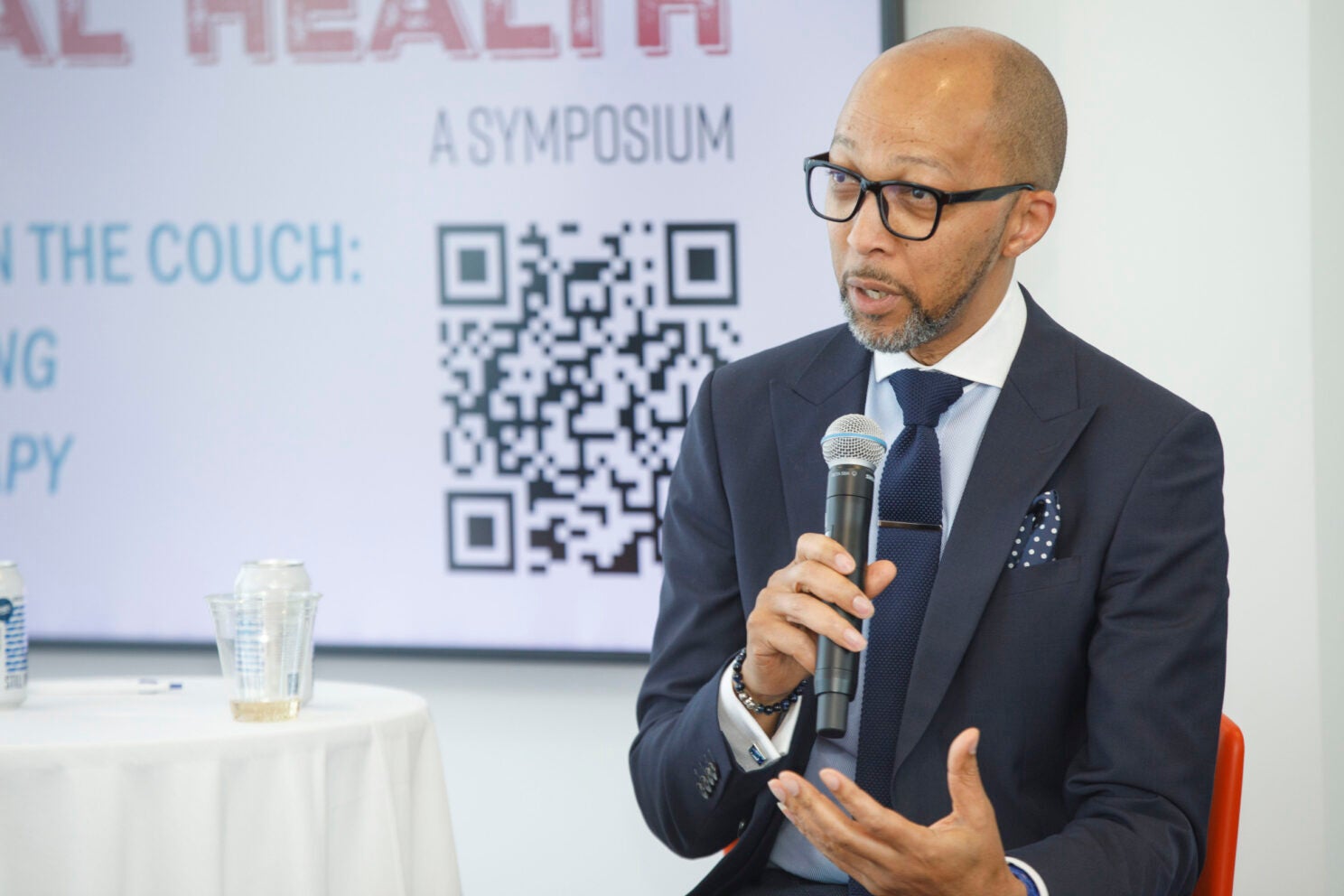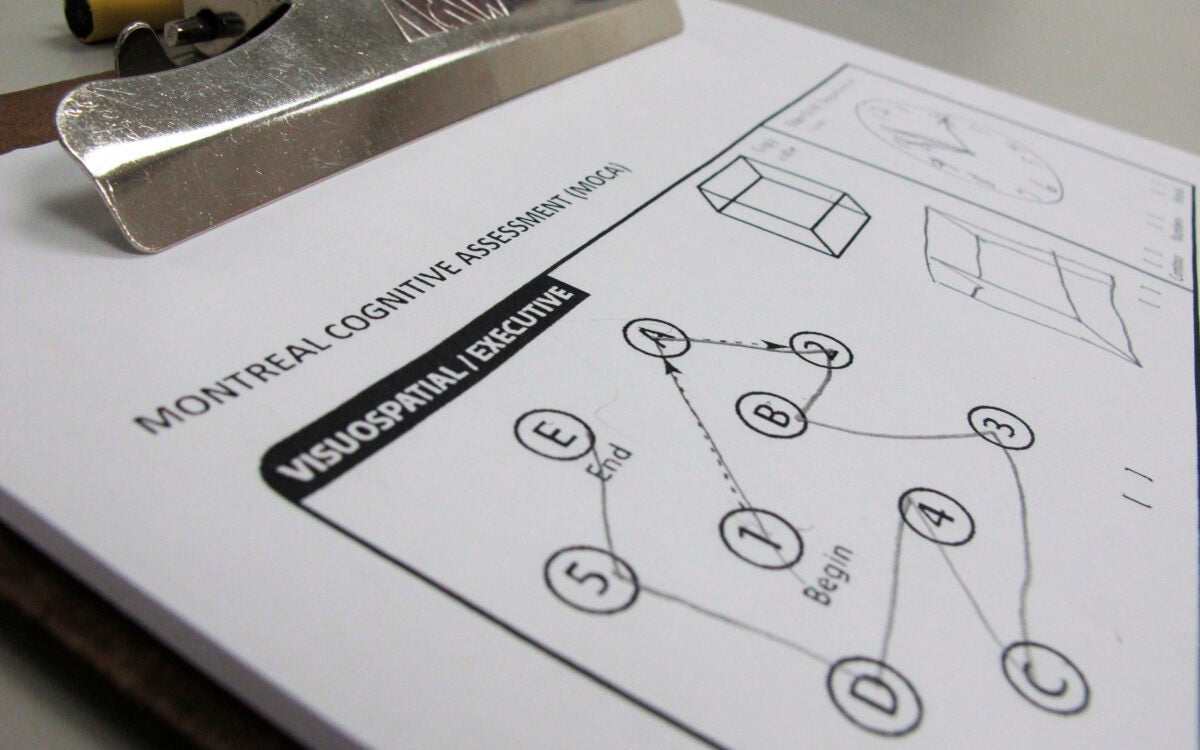What to do about mental health crisis among Black males

During the daylong “Black Men and Mental Health” symposium, Bryan Bonaparte discussed the church’s role.
Kris Snibbe/Harvard Staff Photographer
Symposium examines thorny, multifaceted dilemma from systemic racism in policing, healthcare to stigma attached to psychotherapy in community
Amid a mental health crisis affecting both younger and adult Black males, the Hutchins Center for African & African American Research held a daylong symposium on May 13 to have critical conversations untangling the complexities of the problem and examining potential solutions.
According to the National Institute of Minority Health and Health disparities, Black men are four times likelier to die by suicide than Black women. The American Academy of Child and Adolescent Psychiatry has seen a 60 percent rise in suicide rates among Black boys over the past two decades.
“While we see a significant rise in our young people experiencing feelings of sadness, anxiety, anger, or hopelessness, we know that young people of color are having an even harder time compared to their peers,” Boston Mayor Michelle Wu ’07, J.D. ’12, said in a video message as part of the opening ceremonies. “Black boys and Black men face the additional challenges of stigma and systemic racism so entrenched that it affects the quality of mental health care they receive.”
Michael Rain, a joint fellow at the Edmond & Lily Safra Center for Ethics and the Hutchins Center, said often these issues are “compounded and diluted, leading to a lack of solutions that address our particular needs.”
In various sessions, panelists discussed issues including the impact of “the talk” many Black parents have with their children on how best to safely deal with interactions with police to the stigmatization of psychotherapy in the Black community. Nearly 54 million U.S. residents age 16 or older had police contact in 2020, with Black people accounting for 18 percent.
“We are committed to ensuring that the mental health of Black men and boys is not only a conversation, but it’s at the forefront of the work that we are pursuing.”
Frank Farrow, Mayor’s Office of Black Male Advancement
Some speakers debated the role religion plays in tackling mental health issues, with some saying that God and not therapy allowed them to overcome their traumatic experiences. Participants at a session on psychotherapy, however, pushed back on the notion of religion as a cure-all to mental health challenges.
“I was raised Christian, but I see that the church — in whatever way you want to describe it — can be a stick to beat yourself with,” Bryan Bonaparte, a senior lecturer in psychology at the University of Westminster, argued. “If you’re not doing things in the way that the church wants you to, or you think the church wants you to, then there’s no other way.”
He continued: “Just go and pray is often the response that you get. Do not go and seek someone that has a medical degree, because you’re not going to get your answers from a book. You’re going to get your answers from up there.”
Psychologist Martin Pierre noted that Black men should be allowed to not only identify and feel their emotions, but to make connections and relationships that will allow them to cope with the stresses of being a Black American. He also called for a more culturally responsive approach to mental health issues in the Black community.
“Black Men and Mental Health” was the brainchild of the Rev. Professor Keith Magee from the University College London’s Black Britain and Beyond think tank. Magee planned the conference with Hutchins Center director Henry Louis Gates Jr. after receiving thousands of responses from Black men and those who care about Black men about his CNN op-ed. The city of Boston also partnered in the event.
“It’s an honor for us to convene this symposium, which is providing a vital public service by giving voice to the complex, often difficult, yet crucially important set of issues surrounding Black men and mental health at a time in our country that can only be described as gruesome,” said Gates, who is also the Alphonse Fletcher University Professor.
Attendees pushed panelists and organizers to continue these conversations and encourage policy changes that will help Black men and boys on local and national levels. In response, former Democratic U.S. Representative Kendrick Meek from Florida promised to use his connections to make positive change.
Earlier in the day, Frank Farrow, executive director of the Mayor’s Office of Black Male Advancement in Boston, had also noted the importance of retaining focus on marshaling resources and finding solutions.
“We are committed to ensuring that the mental health of Black men and boys is not only a conversation, but it’s at the forefront of the work that we are pursuing,” Farrow said. “We know that Black men and boys face deep inequities, disparities, and we want to make sure that we’re leading and that our voice is at the forefront.”




